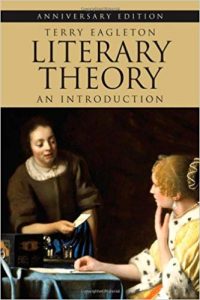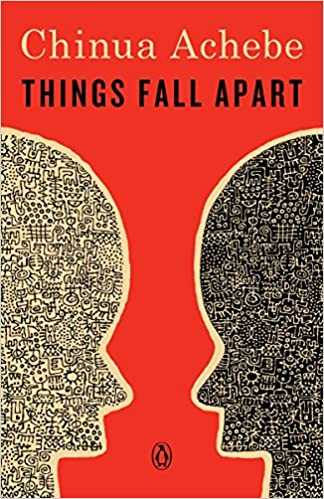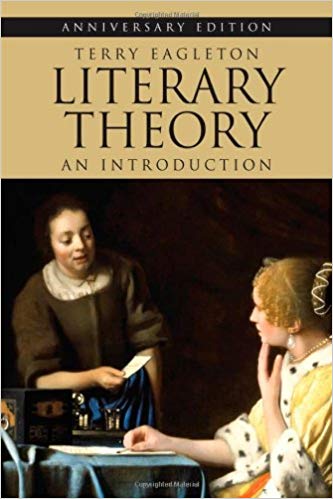M, W 3: 30-4:50
Classroom: LANG 114
My Office: LANG 408D; My Email: mraja@unt.edu
Office Hours: M, W 10:00-12:00 and by Appointment
Final Exam Questions
ENGL 4150
Spring 2020
Due Date: May 7, by NOON either through Canvas or through direct email to me: mraja@unt.edu
Please answer all questions (at least two double spaced typed pages for each question).
Cite from the text to argue your points.
Follow the MLA citation system
Question One:
What do you understand by New Criticism? Please discuss using the explanation of criticism as discussed by John Crowe Ransom.
Question 2:
What do you understand by scholarship of detachment and about the difference between creative and critical imagination. Discuss using the essay by Mathew Arnold.
Question 3:
Discuss Eagleton’s explanation of Freudian Psychoanalysis, especially the resolution of the Oedipus complex.
Question 4:
What are some of the main ideas discussed in Louis Althusser’s essay on Repressive and Ideological State apparatuses?
Question 5:
How does Saussure study the language? Discuss the following concepts:
Signifier and the signified; Langue and Parole; Meaning as differential.
Question 6:
What is your basic understanding of deconstruction? Discuss using either “Plato’s Pharmacy” or my recorded lecture on the subject. You may also use outside research for this question.
Course Plan from now until the end of the semester:
Livestream links:
On Feminism:
Apr 27
April 20:
April 22:
ALL Video Lectures on Eagleton and Literary Theory
Copy of My email:
In the face of the COVID-19 pandemic, the College of Liberal Arts and Sciences is committed to your academic success, while protecting the health and safety of UNT students, faculty and staff. It is my goal to ensure that the restrictions placed on us by the pandemic do not negatively affect your experience in mu course.
To ensure the continuity of learning, all instruction and associated instructional activities for ENGL 4150 will be online until the end of the spring 2020 semester. Please keep an eye on the course web page for any updates:
https://postcolonial.net/2019/10/engl-2440-banned-books-s-2020/
- All course announcements will be posted on the web page. I understand that some students may not have access to their textbooks due to travel restrictions placed by COVID 19. I will try to provide recommendations for alternative educational resources that are available on-line, whenever possible.
- We will have synchronous (live) class meetings during the regular class meeting times through a private livestream on my YouTube channel. I will send you the link to the livestream through your campus email and will also post it on the course webpage. Please note, that the recorded versions of these sessions will also be available and I will send you a private link if you need it. The live sessions allow questions and comments through a chat box, so please feel free to post your comments and questions.
Exams:
I have decided to cancel our midterm exams (the total points for the exam will be added to your grade total) and we will now only administer a take-home final exam. I will send you the questions for the Final Exam a week before it is due and you will be able to submit it through the course CANVAS site or through my email: mraja@unt.edu..
- For the rest of the semester, your attendance/class participation will be evaluated based on your participation in livestream sessions.
- The course schedule and assignment deadlines have been adjusted to account for class cancellations during the week of March 16-22. Such adjustments will be reflected on the course web page
- I will hold virtual office hours and can talk/ text you through WhatsApp. Please email me if you need to talk to me and we can exchange the contact information.
- I will announce any additional changes to course delivery, including unexpected cancellations, on course webpage.
I hope that we will be able to have a very productive rest of the semester in spite of the COVID-19 health emergency. However, I recognize that this is an adjustment for all of us and I appreciate everybody’s flexibility and understanding as we make adjustments to the course delivery format. If you have any concerns about your ability to complete your course work due to health, family or other reasons, please let me know as soon as possible, and I will do my best to help you find the best solution.
Introduction:
This course aims to introduce you to the major critical approaches available for analysis and appreciation of literary works. The terms theory and literature  themselves are not free of controversy and have been defined in numerous, often conflicting, ways. This course will apprise you of the major debates in the field of literary theory and their impact on the critical reading of literature in particular and the real-life culture in general.
themselves are not free of controversy and have been defined in numerous, often conflicting, ways. This course will apprise you of the major debates in the field of literary theory and their impact on the critical reading of literature in particular and the real-life culture in general.
We will also discuss the politics and poetics that constitute what we perceive as literary and the role of the academy and popular culture in defining and refuting any hard boundaries. In today’s world, literary theory is increasingly in constant embrace with the culture, and this course will take into account the overlaps and the disjunctures between the critical and the cultural theory.
Discussed also will be the role of literature in defining or articulating the world around us, and, in certain cases, the role of literature in normalizing the hegemonic drive of the powerful. Such an approach to literary theory will make us question our own privileged place in the university setting and, in the world, and help us articulate personal goals of becoming politically aware and culturally diverse world citizens. Throughout this course, we will attempt to relate our in-class activities to the world of the lived experience beyond the university campus.
This is a demanding and writing-extensive course, so please come prepared for a challenging and mentally stimulating experience.
Required Texts:
Class Reader [To be provided by the Instructor]
Eagleton, Terry. Literary Theory: An Introduction, 2nd Edition.
Handouts:
Suggested Text
The Norton Anthology for Literary Theory and Criticism. 3rd Edition [Please get it if you are serious about literary studeis]
Videos:
Course Policies and Requirements:
You are expected to come prepared for class: This involves reading the assigned texts, listening carefully to your peers, and contributing your views in a collegiate and stimulating way. Attendance is mandatory.
Distribution of Points:
Weekly Quiz 100 Points
Group Presentation 300 Points
Class Participation 100 Points
Mid Term Paper 200 Points
Term Paper 300 Points
Total 1000 Points
YOU MUST FINISH ALL MAJOR ASSIGNMENTS TO PASS THE COURSE
Class Participation (100 Points)
As this is a seminar based on a discussion format, your thoughtful participation is essential to the success of the class. I encourage collegiate, open, and thought-provoking class discussions. Remember, we are all here to learn, so let us share our ideas and knowledge to make this class into a dynamic learning experience.
Term Paper: (Guide) (300 Points)
The final term paper will be due on the last day of class. The paper should be 12-15 pages, with a clearly defined thesis and a coherent argument using one or two of the theoretical approaches discussed in class. I would encourage you to choose your topic early and do extensive research. I will be available to assist during all stages of your research and composition process.
Attendance:
You are expected to attend the class regularly. You will be in the danger of failing the course if you miss more than TWO class sessions.
Plagiarism
Plagiarism is against the law, and will result in automatic failure in the course. Simply stated, plagiarism is when you try to pass anyone else’s work as your own or if you turn in your own work written for another class.
Please review UNT Policy on Academic Integrity for details.
ADA
If you have a disability, please contact the campus ADA office and bring me the necessary documentation. I will try my best to accommodate you if you need any special instruction or assistance.
SENATE BILL 11 (“CAMPUS CARRY”). Students must read UNT’s policy on concealed handguns on campus, which I’ve posted on Blackboard (or see http://campuscarry.unt.edu/untpolicy.) Here I note that 1) only licensed persons may legally carry handguns on campus, and 2) this right only authorizes the licensed carrying of “handgun[s], the presence of which is not openly noticeable to the ordinary observation of a reasonable person.” Per policy, if a gun is “partially or wholly visible, even if holstered,” it’s not legal on campus, whether or not it’s licensed. I report all illegal activities to the UNT police, regardless of their nature.
“ACTIVE SHOOTER SITUATIONS.” All students should be aware of UNT’s guidelines for responding to “active shooter situations” (seehttp://emergency.unt.edu/get-prepared/Active-Shooter).
Grading Scale:
A 900-1000
B 830-899
D 600-738
F Less than 600 Points
Discussion:


